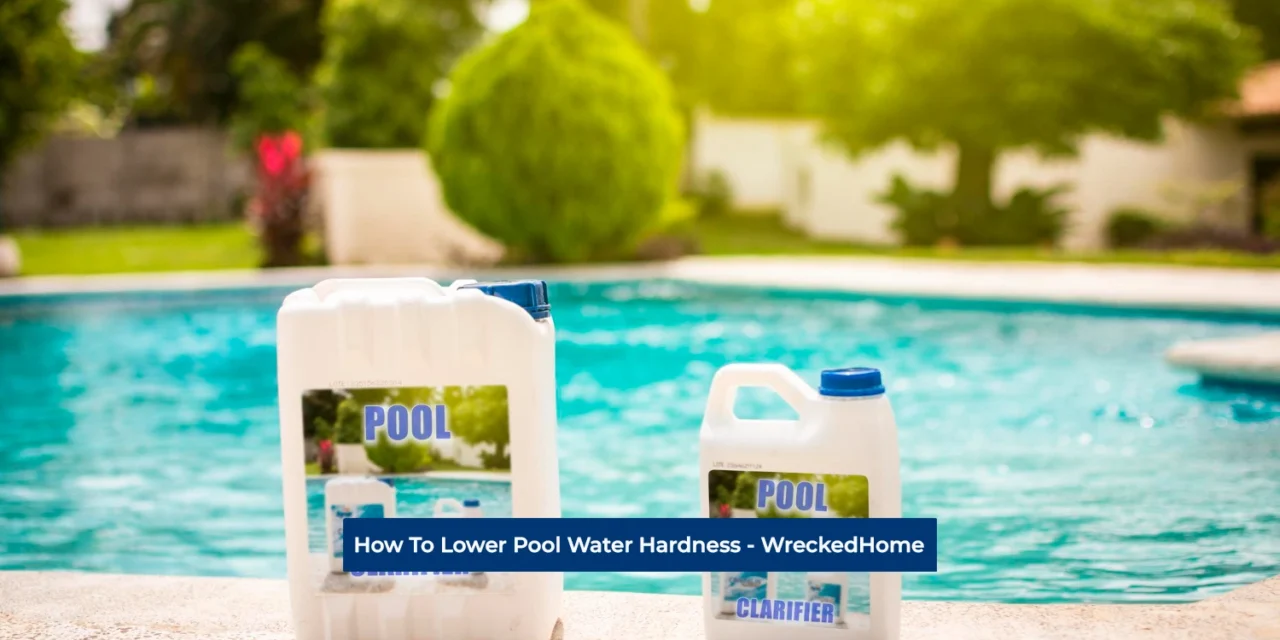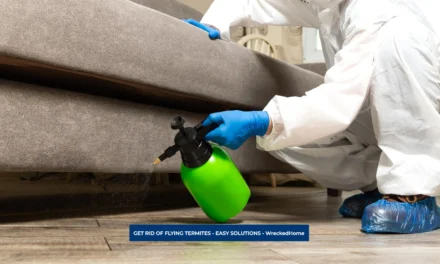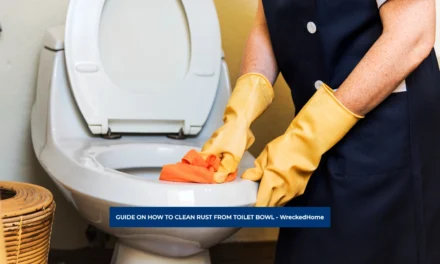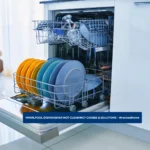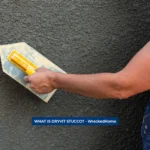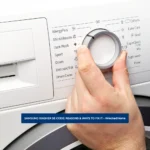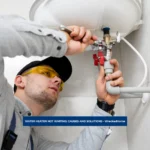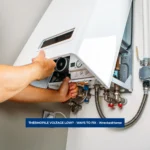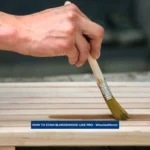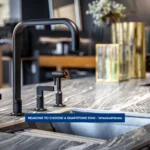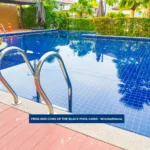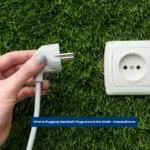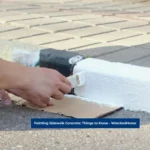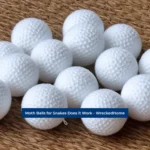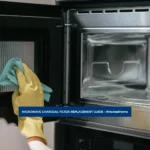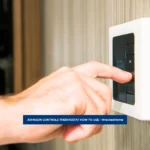In the facet of pool maintenance, understanding and managing water hardness is crucial for pool care and also ensures the swimmers health. Pool water hardness refers to the concentration of minerals, particularly calcium and magnesium that can accumulate and lower the water quality.
Striking a harmonious balance in your pool’s water composition ensures the longevity of pool equipment, this prevents scale formation on surfaces, and promotes optimal chemical efficiency. Among the key players in this aquatic symphony is the challenge of addressing high water hardness especially managing the calcium levels, which can lead to scaling and cloudy water.
In this guide we will unravel the intricacies of pool water hardness and, more importantly, offer a guideline on how to lower pool water hardness effectively. It takes no special tools or Drills. As we navigate through the importance of water balance and the impact of high hardness levels, you’ll find ways to keep your pool water crystal clear and inviting. So, grab your skimmer and let’s dive into the art of maintaining the perfect pool equilibrium.
- What is Calcium Hardness? (How to lower pool water hardness)
- Hard Pool Water (How to lower pool water hardness)
- Soft Pool Water (How to lower pool water hardness)
- How to lower pool water hardness?
- Maintenance Practices (How to lower pool water hardness)
- Factors Contributing to High Pool Water Hardness (How to lower pool water hardness)
- Conclusion (How to lower pool water hardness)
- FAQs (How to lower pool water hardness)
What is Calcium Hardness? (How to lower pool water hardness)
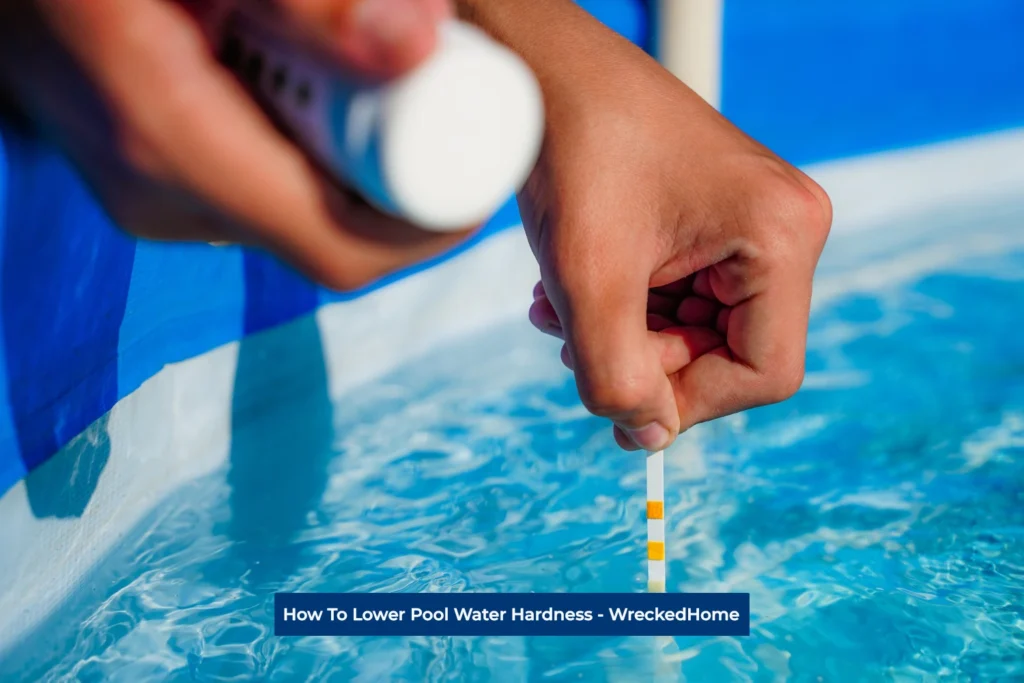
Calcium hardness serves as a crucial metric in the quantitative gauge of pool water hardness or softness. This parameter specifically quantifies the concentration of dissolved calcium within the pool water. With maintenance of calcium hardness levels, you can preserve the structural integrity of the pool and the well-being of its components.
The recommended range for calcium hardness typically spans from 150 to 400 parts per million (ppm), and is essential to prevent issues associated with water aggressiveness or scaling. If the calcium hardness is too low, the water may become corrosive which can also destroy the pool surfaces and equipment.
Conversely, excessively high levels of calcium hardness can lead to the formation of scale deposits that can potentially obstruct the efficient functioning of the pool system. Regular monitoring and adjustment of calcium hardness not only ensures the longevity and performance of the pool infrastructure, but also offers an enjoyable experience to the user.
Testing for Calcium Hardness (How to lower pool water hardness)
Unlike the routine evaluations required for chlorine, pH, and total alkalinity, testing for calcium hardness might find a bi-weekly schedule more beneficial. The testing frequency is contingent on the water quality inherent to your location, gauging the mineral content of your water regularly to prevent potential issues. With calcium hardness, periodic examination allows you to adjust and maintain the optimal balance. This empowers you to tailor your testing routine for calcium hardness and contributes to how to lower pool water hardness.
Hard Pool Water (How to lower pool water hardness)
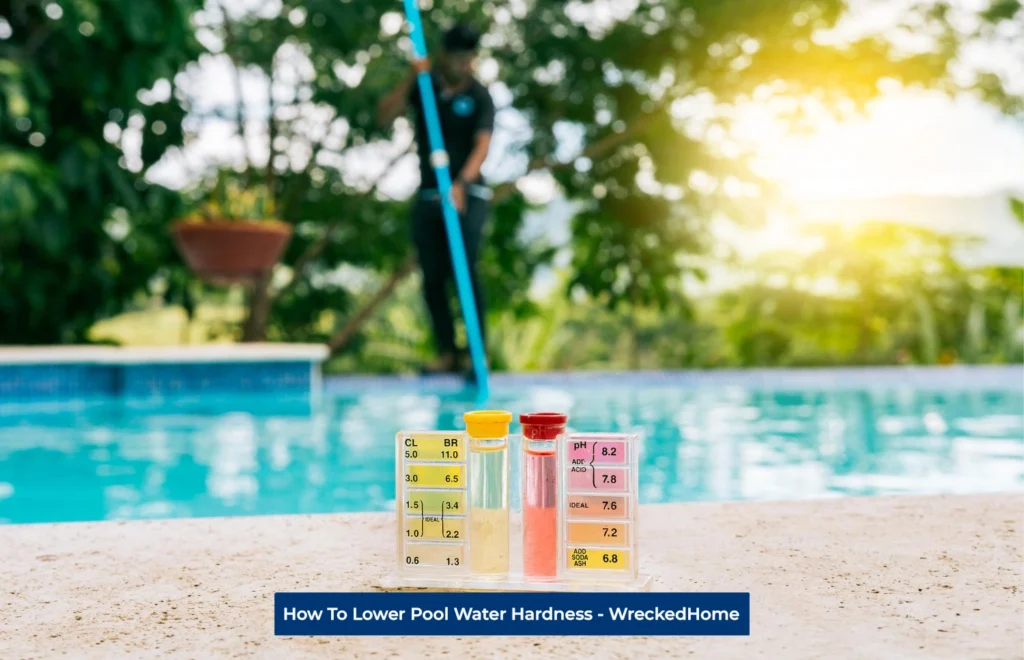
When the calcium hardness in your pool water exceed 400 parts per million (ppm), there is cloudiness in the pool water, a visual cue that conventional remedies such as pool shocking or clarifier usage might fail to rectify. The pool surfaces, particularly the walls, may undergo a transformation, acquiring a sandpaper-like texture that is signaling the undesirable effects of elevated calcium hardness.
These visible manifestations collectively serve as a red flag, prompting the need for immediate corrective measures. Ignoring these signs can lead to loss of aesthetics and functionality of the pool. Do you know how to lower pool water hardness? Addressing elevated calcium hardness ensures a healthier and more enjoyable swimming experience for pool enthusiasts.
Soft Pool Water (How to lower pool water hardness)
In contrast, when the calcium hardness in your pool water descends below 150 parts per million (ppm), the water takes on the characteristics of excessive softness. This situation presents a unique set of challenges such as the corrosive nature of the water leading to the dissolution of concrete in the pool walls, further exacerbating structural concerns.
Additionally, metal components within the pool system can result in substantial repair costs, associated with overly soft pool water. Regular monitoring and adjustments of calcium hardness levels also safeguards against the financial burden of extensive repairs,
How to lower pool water hardness?
Hard water, laden with an elevated mineral content has a bad impact on daily life. Whether it’s the impact on appliances, plumbing systems, or personal care, it is necessary for providing practical solutions to homeowners.
- Water Softeners: The most common solution of water hardness is the use of water softeners. These devices employ an ion exchange to replace calcium and magnesium ions—the hardness-causing minerals are exchanged for sodium ions, resulting in softened water. Water softeners come in various types, including salt-based and salt-free alternatives. Choices depend on individual preferences, water usage patterns, and environmental considerations.
- Reverse Osmosis Filtration: Reverse osmosis (RO) filtration is another effective method that involves forcing water through a semi-permeable membrane, selectively allowing water molecules to pass while blocking minerals and impurities. RO systems are versatile and can be installed under the kitchen sink, or as a whole-house system.
- Adding Citric Acid: This is a natural and cost effective method for lowering pool water hardness. The chemical composition in citrus fruits acts to break down the lime and scale. It is also a really cheap method. It may be more suitable for smaller-scale applications or temporary solutions.
- Boiling and Cooling: Boiling and cooling water is a straightforward and energy-efficient method. The minerals responsible for hardness precipitate and settle at the bottom of the container. After boiling, allow the water to cool which provides a quick solution for small quantities of water; it may not be practical for larger-scale applications or continuous use.
- Distillation: Distillation is a comprehensive water treatment; water is heated to create steam, leaving behind impurities and minerals. The steam is then condensed back into liquid form. This is a reliable solution for homeowners seeking a consistent supply of softened water.
Maintenance Practices (How to lower pool water hardness)
In the delicate ecosystem of pool maintenance, preventing high water hardness is a proactive endeavor that serves as guardians against the escalation of water hardness in your pool. From routine monitoring and chemical management to mindful control of environmental factors, you can get quality water with these practices. It is the answer of how to lower pool water hardness
- Regular Monitoring and Testing: The cornerstone of water hardness is ideally conducted on a weekly basis, allowing for the early detection of fluctuations in calcium levels. Utilize reliable water testing kits to check the recommended range of 150 to 400 parts per million (ppm). This proactive approach enables a monitoring strategy that caters to the unique characteristics of the water supply, providing a tailored response to potential challenges.
- Proper Use of Pool Chemicals: This is one of the best ways for learning how to lower pool water hardness. The judicious application of pool chemicals utilized with precision, contribute to water balance without tilting the scales towards hardness extremes. Regularly testing and adjusting pH, alkalinity, and calcium hardness levels in tandem form the foundation of preventing high water hardness.
- Controlling Evaporation and Water Concentration: This is another good method to help you learn how to lower pool water hardness. The sun’s warming bring joy to pool enthusiasts but also introduce a subtle challenge—evaporation. As water evaporates, minerals, including calcium, become concentrated and cause water hardness with gradual accumulation. Pool covers serve as effective barriers, maintain optimal water levels through regular monitoring and replenishment curtails safeguard against the silent progression of high water hardness.
- Adjusting pH and Alkaline Levels to Prevent Scaling: The interplay of pH and alkaline levels in pool water continue to change the water quality. A pH level outside the optimal range of 7.2 to 7.8 can trigger scaling—consequently, high water hardness. Regular testing of pH and alkalinity create an environment that not only enhances water clarity but also prevents the onset of elevated water hardness.
Factors Contributing to High Pool Water Hardness (How to lower pool water hardness)
Maintaining the perfect balance in your pool water composition is an intricate dance that is more challenging. But you can control it by paying attention to diverse factors that contribute to the escalation of pool water hardness. Let’s explore these factors that collectively shape the aquatic environment by knowing this helps in how to lower pool water hardness.
- Source of Water Supply: Municipal water supplies, well water, and other sources carry minerals, with calcium as the initial composition of the water contributes to the pool’s overall hardness.
- Use of Calcium-Containing Pool Chemicals: The intentional introduction of pool chemicals, particularly additives like calcium chloride or calcium hypochlorite, contribute to an increase in calcium levels.
- Evaporation and Concentration of Minerals: As the sun’s rays kiss the pool’s surface, the water evaporates and leaves behind concentrated minerals in the remaining water.
- Impact of High Temperatures: Elevated temperatures accelerate chemical reactions, the evaporation rate rises, serves as a catalyst for heightened water hardness, posing challenges to both water clarity and equipment longevity.
Conclusion (How to lower pool water hardness)
In the intricate aspect of pool maintenance, the art of preventing high water hardness with the help of regular monitoring and testing is essential. It is also essential to know how to lower pool water hardness. The wise use of pool chemicals, coupled with a keen eye on pH and alkalinity levels, shield against the gradual accumulation of minerals that could tip the scales towards hardness extremes. As this preventive dance unfolds, the pool becomes an oasis—an embodiment of clarity, comfort, and enduring vitality.
If you find that you cannot lower the water hardness in your pool, then call in a professional. Find A Pro Near You Here!
FAQs (How to lower pool water hardness)
How do I remove hardness from my pool water?
If you’re certain that your tap water isn’t hard, using a flocculant offers a reliable convenient solution. The excessive chemical binds and your sand filter can then efficiently remove it to ensures the balance of your pool water.
How do you remove hardness from water naturally?
Vinegar proves to be a natural and effective remedy that has the ability to dissolve calcium, magnesium, and other mineral deposits in hard water. Beyond its mineral-dissolving properties, vinegar also competes with bacteria, mold, and germs. This simple household hack provides a natural softening solution to your pool water.
How do you lower pH and water hardness?
To naturally lower pH and water hardness, you can opt for peat moss. It releases tannic and gallic acids that lower pH levels and mitigate water hardness. With knowledge of how to lower pool water hardness you can enjoy balanced healthy pool water.

